by ewestbrook | Oct 6, 2016
Here in North Florida, as the dogwood trees start to turn colors and drop their leaves and I wait for the first cool breezes of a seemingly delayed Autumn I often find my memory is easily awoken by hints of past falls.
As a teen I participated for several years in the Agricultural Judging contest on the Wakulla County 4-H team. I fondly remember sticking my nose into a bail of bahia grass hay to check it for freshness. I can still recall my nerves as I stood silently beside my peers, clipboard in hand, intently looking over hogs and heifers rating them by confirmation and preparing the oral reasons to defend my decisions. The feel of oats in my hand as I compared and contrasted the merits of several samples.
The lessons I learned in Ag Judging stayed with me. It was one of my first introductions to the science of Agriculture. As a 4-H Horse project kid before my participation in the contest I had never stopped to consider many of the other aspects of agriculture that informed and supported my interest in horses and my horses themselves.
Understanding how to recognize and judge the grain and hay I fed my animals daily sparked an even greater understanding and interest in agriculture as a whole. Learning to judge other livestock piqued my interest in equine judging and led me to compete in that event at the state level and even win a state judging division one year. Once I was able to drive, my experience in judging agricultural commodities gave my parents the confidence to send me to buy the large amounts of hay and grain needed to keep the horses at our family’s boarding stables happy and fit. One less chore for them to have to worry about.
In college as an agricultural student I found that the 4-H judging programs I had participated in had prepared me perfectly for the practical lab tests in class. I discovered that they were set up in the same format as the 4-H programs I had been in just a few years before. 4-H helped me prepare for college by giving me practice in the exact kind of tests and exams as I would face in almost every practical agricultural lab I would end up taking.
Reading this some might think that the Agricultural Judging contest sounds great for a farm boy or girl looking to have a career in agriculture but it may not be for me or for my 4-H’er. They may change their minds after considering the life skills learned. The ability to think on your feet and the independence to rely on personal knowledge when making decisions are vital real world examples. These are the exact positive life skills that 4-H judging competitions teach and hone in young people.
Long-time Leon County 4-H Agent Marcus Boston says that he has, “seen the positive difference that 4-H has on young people. Agricultural judging teaches independent thinking. Youth have to make choices based off what they know and can’t ask for someone else to decide for them. That’s what you have to do every day as an adult.” Mr. Boston has been organizing the Ag Judging program at the North Florida fair since I was participating in the early 2000’s. That kind of dedication speaks to a real belief in the benefits and results of a program.
The youth who participate in the program can anticipate judging categories that will be chosen from the following:
- Beef (Steers)
- Poultry
- Corn (shelled)
- Oats
- Heifers (Beef)
- Perennial Peanut Hay
- Soybeans
- Grass Hays (e.g. Bahia, orchard grass)
Since different categories depend on availability and community support participants should be prepared for all of the categories.
If coaching or participating in an ag judging team appeals to you, contact your local UF IFAS County Extension Office or visit http://florida4h.org. You can find out more about ag judging at these links:
by Marcus Boston Jr. | Sep 29, 2016
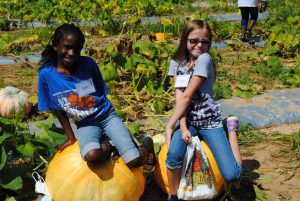
Youth learn about pollination and nutrition at the pumpkin station. The center grows several varieties to demonstrate the diversity of the plant family.
What has 1600 eyes, 1600 legs, can be male or female, and has enough energy collectively to send a rocket to the moon? The 3rd – 5th graders that participate in the multi-county 4-H Ag Adventures Program! This educational adventure is held annually during September at the UF/IFAS North Florida Research and Education Center in Quincy, Florida. This event helps youth understand where their food comes from, the importance of agricultural industry in Florida, and career opportunities in agriculture related fields. Students are introduced to field crops as they rotate through stations that cover peanuts, corn, cotton, pollination, pumpkins, and soils. At each station county extension agents and IFAS research faculty provide “hands on” presentations that are prepared to enhance the students learning experience.
In addition, this event is a platform for youth to learn the current trends, issues and challenges farmers face as they continue to try to feed our increasing population. Some of these trends and challenges include food safety and bio-security, farm labor, bio-security, land use, pest and disease control, and the use of technology in agriculture. This issues encompass all four of the “H’s” in 4-H: Head, Heart, Hands, and Health.
While some youth still associate “agriculture” with increasing negativity (thinking of the hot sun, extreme fatigue, very hard work, minimal income), a recent poll shared on the website Worldbank.org/youthink/ states the top three reasons youth should consider a career in agriculture are the following:
1. Agriculture matters to the future of development,
2. Agriculture can be a gold mine for young entrepreneurs,
3. Agriculture research needs young brain power.
Regional 4-H Agent Heather Kent shares:
“Although this event is geared towards teaching youth about agriculture, the parents and teachers that attend learn just as much and often have more questions that the youth! The adults are just as curious and amazed at how much agriculture affects their daily lives- especially if they do not have an agricultural background. Most of them have no idea how many careers are related to agriculture or how much today’s farmers utilize technology. It’s a real eye-opener for them.”
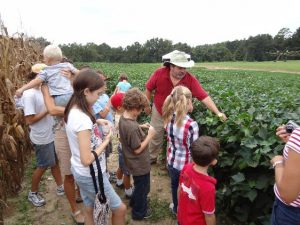
Ag Agent Jed Dillard teaching youth about cotton. Do you know how many pairs of jeans you can make out of a bale of cotton?
This program is sponsored by UF/IFAS, it is also supported by both Florida Farm Bureau and Farm Credit of Northwest Florida. These organizations not only provide funding to help pay for the transportation for students to attend, but they also provide corporate volunteers to help make the event happen. If your child’s classroom missed out on this opportunity, it’s not too late. The North Florida Research and Education Center in Quincy is hosting “Art in the Garden” festival Saturday, October 1st from 9AM -2PM. The event is FREE and open to the public. This event is a great way to learn about agriculture in a fun and family friendly way. There will be trolley tours, demonstrations, games, arts and crafts and food.
In the near future the students that pass through our stations will grow into the adults that will be making important decisions about our food systems. It is in that spirit that we must continue to teach them ….from the ground up. Visit http://faitc.org/kids for more information on careers in agriculture.
If you have a passion or agriculture, consider serving as a 4-H volunteer or advocate to help inspire the next generation. Contact your local UF IFAS County Extension Office or visit http://florida4h.org.
by Heather Kent | Sep 16, 2016
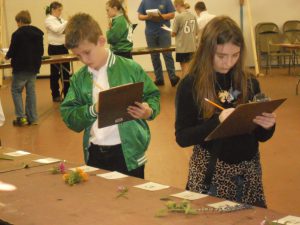
Youth competing at the North Florida Fair Horticulture Judging Contest. Photo credit: UF IFAS Leon County 4-H
For parents who want their child to be prepared for the 21st century workforce, participating in a 4-H judging team may be the answer. Several universities have recently published studies on the impacts 4-H judging teams have had on workforce readiness. The University of Georgia surveyed over 1,300 4-H alumni who reported that judging programs helped them develop confidence and communication and decision making skills (McCann & McCann 1992). A 2005 University of Idaho study found that 97% of alumni indicated that their 4-H judging experience positively influenced their personal success as adults (Nash & Sant, 2005). Similar results were found in studies conducted by Rutgers and the University of Missouri. The life skills attained through judging programs are not only sought-after by employers but are applicable to most professions. In addition, these skills are not always taught in school or on the sports field but are intentionally integrated into the 4-H positive youth development program.
Florida 4-H Alumna (and national poultry and meats judging champion) Stacey Warden shared: “I would not be the person I am today if I had not joined 4-H. 4-H [judging teams] helped me learn how to speak in front of others, build confidence and gave me so many opportunities I would not have had otherwise.” One Missouri 4-H alumna shared: “I have had the chance to meet some of the greatest people in the world, visit many different states, and gain ever so vital experiences in public speaking. Giving oral reasons has helped me sharpen my speaking abilities. In today’s society, communication is the key to success (Sheppard 2005).”
Florida 4-H offers many opportunities for youth to be involved in a judging team. While livestock judging may be the most recognized, we also offer judging programs in forestry,
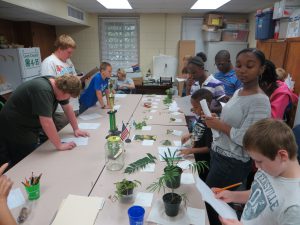
Leon County Master Gardeners help youth practice for the Horticulture Judging Contest.
poultry, land/soils, meats, horticulture, consumer choices, horse, dairy goat and marine ecology. Mastering the subject matter content is only one aspect of the program. Youth work as a team to correctly identify animals, plants, or parts. They also have to learn to make close observations and think on their feet to evaluate the quality of an animal, plant, or product. They master communication and presentation skills by defending their choices in front of a judge (this is called giving oral reasons). The real goal of these programs is to help youth develop confidence, communication and decision making skills that will help them be successful adults in work and personal life later on.
Over the next couple of weeks, we will feature different judging opportunities that will be available this fall at the North Florida Fair. This week, our feature is on the 4-H Horticulture Judging Program. Do you know the difference between opposite, alternate, whorled and palmate leaves? Can you tell the difference between poison ivy and Virginia creeper? Do you know what to look for when purchasing shrubs for your landscape? Youth involved in the 4-H Horticulture judging team do! Horticulture judging is a great way to learn how to correctly identify plants and learn about Florida’s horticulture industry, which is ranked second in the nation and is a billion dollar industry for our state!
Getting started is easy! First, download a copy of the rules and glossary. Begin to familiarize yourself with plant terms so that you can become proficient at plant identification and use of keys. Next, take a look at the online tutorial. There are four modules:
Last but not least, quiz yourself- visit a local grocery store or nursery and see how many fruits, vegetables and plants you can correctly identify! The next opportunity to participate in a horticulture judging contest will be Saturday, November 12th at the North Florida Fair. The state contest is usually held in Gainesville in July in conjunction with 4-H University,
If you have a passion for plants or the horticulture industry, consider coaching or participating in a 4-H horticultural judging team. Together, let’s grow 4-H to help the next generation develop 21st century workforce skills for Florida! Contact your local UF IFAS County Extension Office to sign up as a volunteer or member, or visit http://florida4h.org. Next week, we will feature our consumer choices judging contest.
References:
McCann, J. S., & McCann, M. A. (1992). Judging team members’ reflection on the value of livestock, horse, meats, and wool judging programs. The Professional Animal Scientist, 8, 7–13.
Nash, S. A., & Sant, S. L. (2005). Life-skill development found in 4-H animal judging. Journal of Extension [Online], 43(2) Article 2RIB5. Available at:http://www.joe.org/joe/2005april/rb5.php
Sheppard, L. (2005). Where would I be without 4-H? Missouri Ruralist, October 2005.
by Heather Kent | Jul 15, 2016
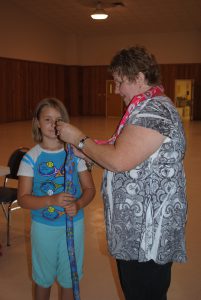
These DIY neck coolers are great to help youth learn about sewing AND science!
Even though it is not yet August, the Florida heat is sweltering. Staying hydrated is key, but you can also stay comfortable outdoors with a neck cooler. The neck cooler helps cool the blood pumping to your head and is a very effective way to prevent heatstroke when you need to be outdoors. This project is also a great beginner sewing project for 4-Hers and volunteers! This project is from the online Maker Movement Magazine. It is also a fun way to tie in the science of hydro-gels polymers. Hydro-gel polymers are long molecule chains that absorb water efficiently and easily. They are used in agriculture to prevent soil erosion, conserve water and even soak up toxic spills from our environment. A great extension of this project would be the Helpful Hydro-gel Experiment by Steve Spangler- the 2008 National 4-H Youth Science Day Experiment.
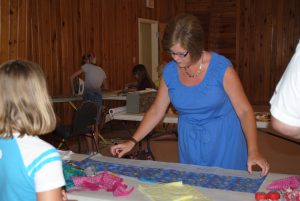
Youth are learning how to measure and cut fabric for their neck coolers with Monica Brinkley, County Extension Director and Agent in Liberty County
Here’s what you need to make your neck cooler:
- 1 piece of fabric measuring 36 inches long and 5 inches wide
- 1 tsp of hydro-gels (found in the gardening supply section of your local store)
- Thread
- Scissors
- Sewing needle (if sewing by hand) or sewing machine
- Iron and ironing board
Fold the piece of fabric lengthwise (right sides together) and press to form a tube. Stitch a 1/2 inch seam across one end and down the length of the fabric. Turn the tube right-side out and press. From the stitched end of the tube, measure 4 1/2 inches and stitch a seam across to make a pocket for the hydro-gels. On the open end of the tube, use a funnel to pour 1 tsp of dry hydro-gel beads inside the pocket. Next, fold the ends of the open tube inside and stitch securely. To activate the gels, simply soak in cool water. Tie around your neck and stay cool!
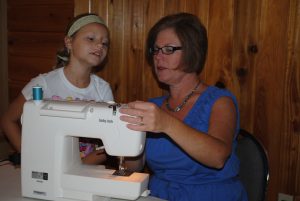
Neck coolers can be sewn by hand or with a sewing machine
Other helpful UF IFAS Extension resources:
Hydration Myths
Hydration in Hot Working Environments
Hydration Safety
4-H Sewing Project Info
by Heather Kent | Jul 8, 2016
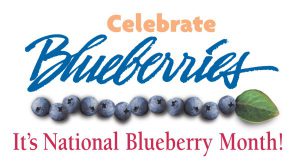 Did you know that July is National Blueberry Month? Blueberries are in season now, and reasonably priced at grocery stores, fruit stands, and farmers’ markets. Many growers also offer a “pick your own” service which can be a fun family outing. The good news is that this delicious treat has many health benefits. Blueberries are low in calories- only 80 calories per cup but are packed with nutrients. A handful of blueberries satisfy the recommended intake of dietary fiber. They are also high in vitamin C- one serving provides 25% of your daily requirement. Blueberries are also high in manganese, which helps the body process cholesterol and nutrients such as carbohydrates and protein.
Did you know that July is National Blueberry Month? Blueberries are in season now, and reasonably priced at grocery stores, fruit stands, and farmers’ markets. Many growers also offer a “pick your own” service which can be a fun family outing. The good news is that this delicious treat has many health benefits. Blueberries are low in calories- only 80 calories per cup but are packed with nutrients. A handful of blueberries satisfy the recommended intake of dietary fiber. They are also high in vitamin C- one serving provides 25% of your daily requirement. Blueberries are also high in manganese, which helps the body process cholesterol and nutrients such as carbohydrates and protein.
Blueberries are a native North American plant, and it was only within the last 100 years that we have been able to grow them commercially. All thanks to Elizabeth White, the daughter of a New Jersey farmer, teamed up with USDA botanist Frederick Coville to domesticate the blueberry. They spent years identifying blueberry plants with desirable qualities for cultivation. They harvested and sold the first cultivated crop of blueberries in 1916- exactly 100 years ago! Until 20 years ago, blueberries could only be grown in northern climates like New Jersey, Maine, and Michigan. Thanks to the University of Florida, southern blueberry cultivars were developed through research that don’t require as many chilling hours and bear more fruit. Although Florida is not currently the leading producer of blueberries, we are quickly catching up with 25 million pounds produced annually!
Fun Facts about Blueberries:
- Blueberries are relatives of the rhododendron family
- The perfect blueberry should have a “dusty’ appearance
- Don’t wash your blueberries until you are ready to eat them (washing speeds up the spoiling process).
- To freeze blueberries, place them unwashed, on a cookie sheet and flash freeze. Then place them in quart-size freezer bags to use later in smoothies, crumbles, cobblers, or ice cream.
- Recent studies show that blueberries may have the potential to aid in memory loss, vision loss and even slow down the aging process
- Native Americans recognized the nutritional value of blueberries and used them for medicinal purposes as well as flavorings
- Early American Colonists used blueberries to dye fabric and also to color paint
This month, celebrate the blueberry by planting a bush, visiting a U-pick farm, or making a tasty home-made blueberry treat. Fresh From Florida (a division of the Florida Department of Ag) has lots of free and delicious recipes. Try Florida Blueberry Parfait, Blueberry Breakfast Casserole, Blueberry and Blue Cheese Salad or even Blueberry Barbecue Sauce!
Additional UF/IFAS Resources about Blueberries:
by Heather Kent | Jun 24, 2016
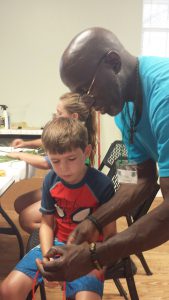
Nate Grimsley is known for teaching crafts at 4-H camp each year.
In a world where so many things don’t make sense, Nate Grimsley has discovered something that does. Ten years ago, Nate’s daughter won 1st place at the Leon County 4-H Tropicana Public Speaking Program and was awarded a full scholarship to Camp Cherry Lake. Nate had attended camp at Cherry Lake as a camper decades earlier and after being asked 9 years ago by 4-H agent Marcus Boston to consider attending camp as a volunteer he said “Yes!” and has never looked back. Today, Nate still serves as a chaperone for camp, but he also teaches art and crafts classes during the week. He has taught hundreds of youth how to make paracord bracelets and to weave fans and insect models out of native palmetto leaves. He is so good at his volunteer role that he is often asked to volunteer at other county camp weeks and even the State Shooting Sports Camp.
“Volunteering is rewarding- I love teaching and it is so fulfilling to give back and to set a positive example for kids. I had a learning disability when I was growing up, so I have a different perspective on how kids learn. I have one rule- they are never allowed to say ‘I can’t.’ They can say they don’t understand, but never ‘I can’t’. It is so rewarding to see them succeed.”
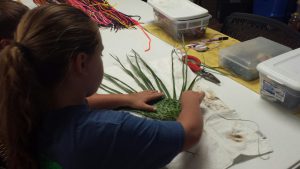
Nate teaches youth to use palmetto branches to weave fans, baskets and even 3-dimensional insect models.
Nate’s example has had a huge impact on his own children. Both of his children served as teen leaders for 4-H. His son’s cabin always won “cleanest cabin” and his daughter was such a good counselor that he was invited to intern at a camp in Maine. “The leadership skills that my kids learned at camp helped both of them land their first jobs. It is a great program and parents and teens should take advantage of it.” Marcus Boston and Stefanie Prevatt, 4-H faculty at the Leon County UF/IFAS Extension Office, have developed a strenuous but highly effective camp counselor leadership program. Even though it is a volunteer position, teens must complete an application, screening, interview and 30-hour training program in order to serve.
Even though Nate’s kids have graduated out of the 4-H program, he continues to serve. In addition to being a certified chaperone, he is also certified to teach archery through the 4-H Shooting Sports program. Erlier this year, he taught workshops for teens at adults at the Northwest Teen Retreat and 4-H State Volunteer Leader’s Forum.
“I am still involved because I just love kids and I love seeing them learn. I have always volunteered in different ways- school boosters, organized sports, but I love volunteering in 4-H so much that my wife and I are starting a 4-H club this fall- the ‘Good Sense 4-H Club.’ Our goal is to help kids learn how to problem solve and make good decisions now and later in life.”
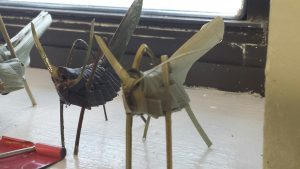
Nate’s palmetto-leaf grasshoppers are a popular camp craft and are extremely realistic looking.
Nate encourages everyone he knows to volunteer. He holds down a full-time job, but has always been able to work with his supervisor to make time for volunteering. “Being a volunteer is a great means of networking. I have met so many interesting people through my volunteer work. I find joy in giving back to others. God has given so much to me- I want to pay it forward. Also, we need solid role models to teach kids how to be independent. 4-H is a great way to do just that.”
4-H offers a wide range of volunteer positions to fit various schedules, interests and abilities. To find out more about volunteering and what is available in your community, contact your local UF IFAS County Extension Office or visit http://florida4h.org/volunteers.











